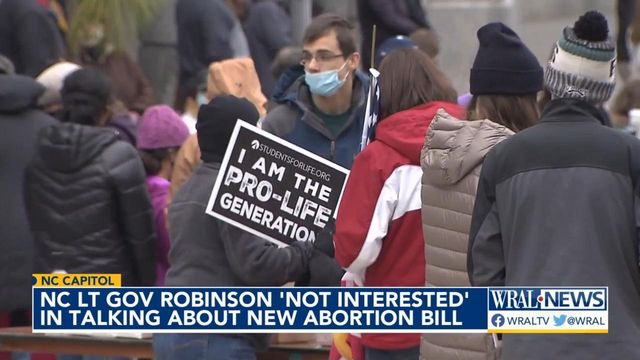As NC abortion bill advances, eyes shift to 2024 governor's race
With new abortion restrictions on their way toward becoming law in North Carolina, the two leading candidates for governor in 2024 are taking drastically different public approaches: The reserved one is outspoken and the outspoken one is suddenly quiet.
Democratic Attorney General Josh Stein, long an advocate for abortion rights, spoke at a rally with hundreds of people protesting the bill Wednesday.
Republican Lt. Gov. Mark Robinson — who has described himself as “adamantly pro-life,” partly because he regrets paying for an abortion in 1989 and is known for fiery speeches — has avoided commenting on the bill backed by the legislature his party controls.
The measure, which would outlaw most abortions in the state after 12 weeks, down from 20 weeks, cleared the state Senate Thursday. Democratic Gov. Roy Cooper plans to veto it, but Republicans say they have the votes to override his veto and pass the measure into law anyway. If that happens, experts say, abortion immediately becomes a key galvanizing issue for voters in 2024, when they’ll pick a new governor and legislature.
Republicans are confident these new restrictions won’t hurt them in 2024, saying they believe the bill is in line with what most voters want. But Democrats say the breakneck speed in play — the bill was publicly filed around 10:45 p.m. Tuesday, had its only public comment opportunity at 9 a.m. Wednesday, and passed the full legislature by 5 p.m. Thursday — is the sort of rushed process lawmakers would only use if they’re scared of protests and want to get the bill passed before most people even learn it exists.
Many political insiders see Stein and Robinson as the favorites to win the primaries and face off in the general election, to decide who replaces the term-limited Cooper.
“This will be a headline campaign issue for all Democrats, from governor down to state legislative candidates, to really actively engage their base,” said Michael Bitzer, a Catawba College political science professor and expert on state politics.
Cooper and Stein, in multiple recent speeches and interviews, have portrayed the bill as all but banning abortion in North Carolina, through fine print in the bill like strict new regulations that could force abortion clinics to shut down.
“If not a total ban, it’s an effective ban on abortion here in North Carolina,” Stein told WRAL News. “And that’s a devastating step backwards for people who want to make these decisions for themselves.”
Robinson, one of the lieutenant governor’s few official duties is to preside over the state Senate, has not been at the legislature this week as the abortion bill rolled out.
His campaign has not returned messages requesting comment on the bill. And when Robinson was asked about it in person Thursday at an event in Charlotte, he told reporters: “I’m tired of talking about abortion. I don’t want to talk about it,” according to WFAE.
That shocked some observers of state politics, considering Robinson’s reputation for outspoken beliefs — especially on the issue of abortion, which he has frequently and harshly criticized in the past.
“I don’t remember the last time Mark Robinson has refused to comment on anything, from the weather to public policy,” said Chris Cooper, a Western Carolina University professor who specializes in North Carolina politics. “So I think it is notable that he didn’t weigh in on the issue.”
Abortion was also a big issue in the 2022 midterms, which happened just as the U.S. Supreme Court overturned Roe v. Wade. Democratic candidate Cheri Beasley wasn’t able to use that to win the open U.S. Senate race here, but Cooper said 2024 could be different, since now there’s something real to point to.
“Cheri Beasley had to sell what might be behind door No. 2,” he said. “Josh Stein is going to be able to point to what happened. And what happened is a lot bigger motivator for voters than what could happen.”
Robinson’s evolving views
Robinson’s position on the issue has evolved over the past two years, as his run for governor has gotten closer.
Last month, when he announced his candidacy, Robinson said: “We need common-sense legislation to prevent abortions after a heartbeat is detected.”
Heartbeat laws typically ban abortion at six weeks. One in South Carolina was recently ruled unconstitutional.
In February, before he officially launched his gubernatorial campaign, Robinson had a different stance. He said if he were governor he would sign a bill banning all abortions — with no exceptions for issues such as rape, or to save the life of the mother.
“If I had all the power right now, let’s say I was the governor and had a willing legislature, we could pass a bill saying you can’t have an abortion in North Carolina for any reason,” Robinson said in February on a radio show hosted by one of the state legislature’s more conservative members, Rep. Jeffrey McNeely.
When he first took office in January 2021, he called abortion “murder.”
Abortion is one of many issues on which Robinson has adopted far-right stances. That has helped him win a devoted following in the GOP base.
But in North Carolina, winning a statewide election in a high-profile race for governor requires appealing to at least some moderate voters. That’s led many to wonder if Robinson can tone down his rhetoric now. Bitzer said the 12-week ban Republicans passed was clearly intended to strike a balance between satisfying the GOP base but also not alienating moderates.
“We’ll have to see how this threads that very delicate needle eye to see what the voters respond to,” he said.
Faced with the fact that his stance is far to the right of what his party just passed, Robinson’s strategy so far has been to change the subject.
While he didn’t want to talk about abortion, he did say this, according to WFAE: “What I’m interested in talking about now is how we’re going to make life better for folks after they’re born.”
State Treasurer Dale Folwell, the other Republican who has announced a campaign for governor, told WRAL News in a text message Thursday that he would sign the 12-week ban if he were governor now.
“I have always been pro-life with the three exceptions, and that’s true yesterday, today and tomorrow,” Folwell said. “I value the opinion of all women, including Republican women legislators who worked hard to craft this proposal.”
Former U.S. Rep. Mark Walker, who is said to be mulling a run for governor, did not respond to a WRAL News request for comment Thursday, but he has consistently called for more abortion restrictions.
Possibility of further restrictions
A WRAL News poll in June showed that most North Carolinians wanted abortion laws to stay the same or become less restrictive. A few months later, another WRAL News poll showed that Tar Heel State residents were supportive of a law banning abortion at 20 weeks, but they were more divided on whether further restrictions are needed.
Democrats are expected to campaign on the idea that, if Republicans win the Governor’s Mansion and keep a supermajority in the legislature, they’ll pursue stricter abortion laws than they’re proposing this year.
Speaker of the House Tim Moore said Wednesday that he didn’t expect further abortion legislation — at least during this legislative biennium, which lasts through 2024.
But the lingering possibility of even stricter abortion bans in 2025 — especially if there’s a Republican governor in office — will be a hallmark of Democratic ads next year, and a question many voters will have themselves.
“It is going to be a primary fight in next year’s election, over not just the dynamics of what this legislation is, but also what potentially could come further, post-2024,” Bitzer said. “I think a lot is going to be riding on that.”













